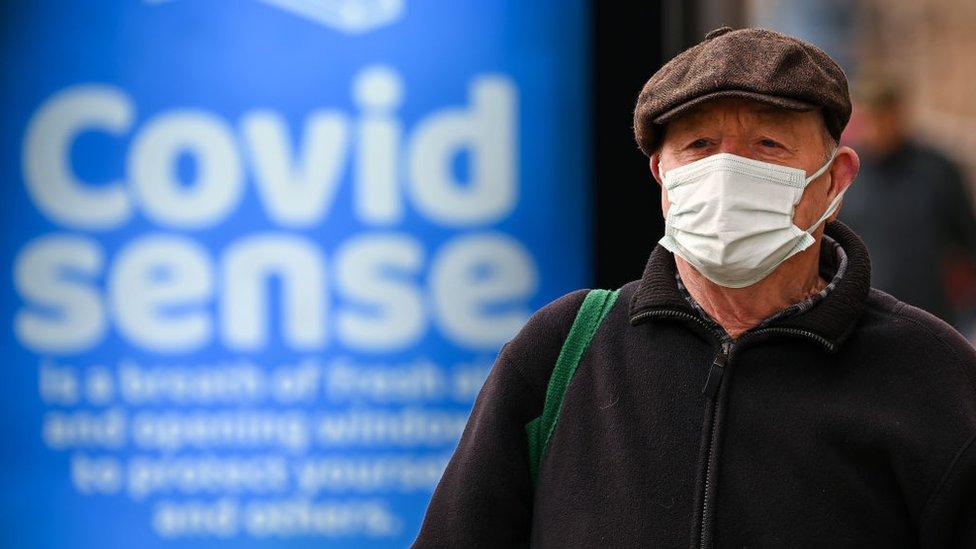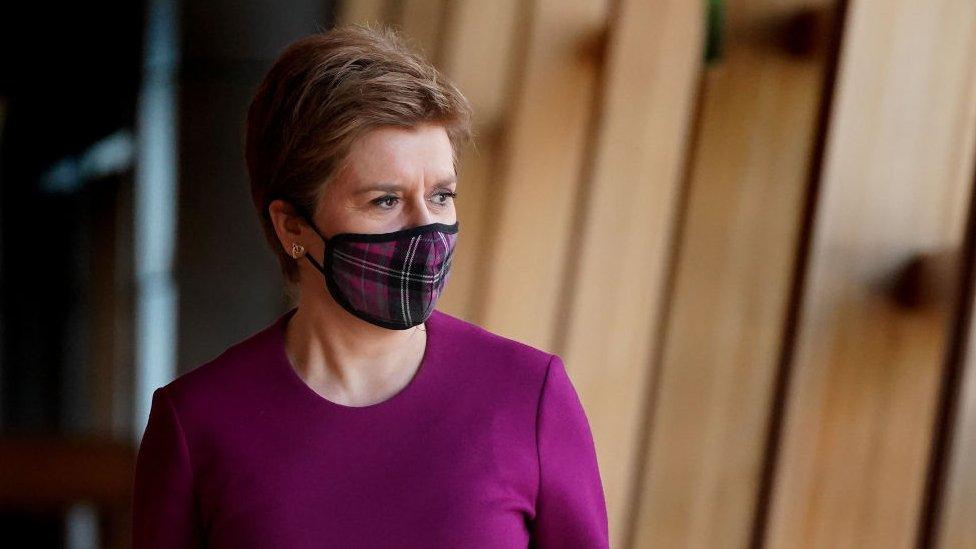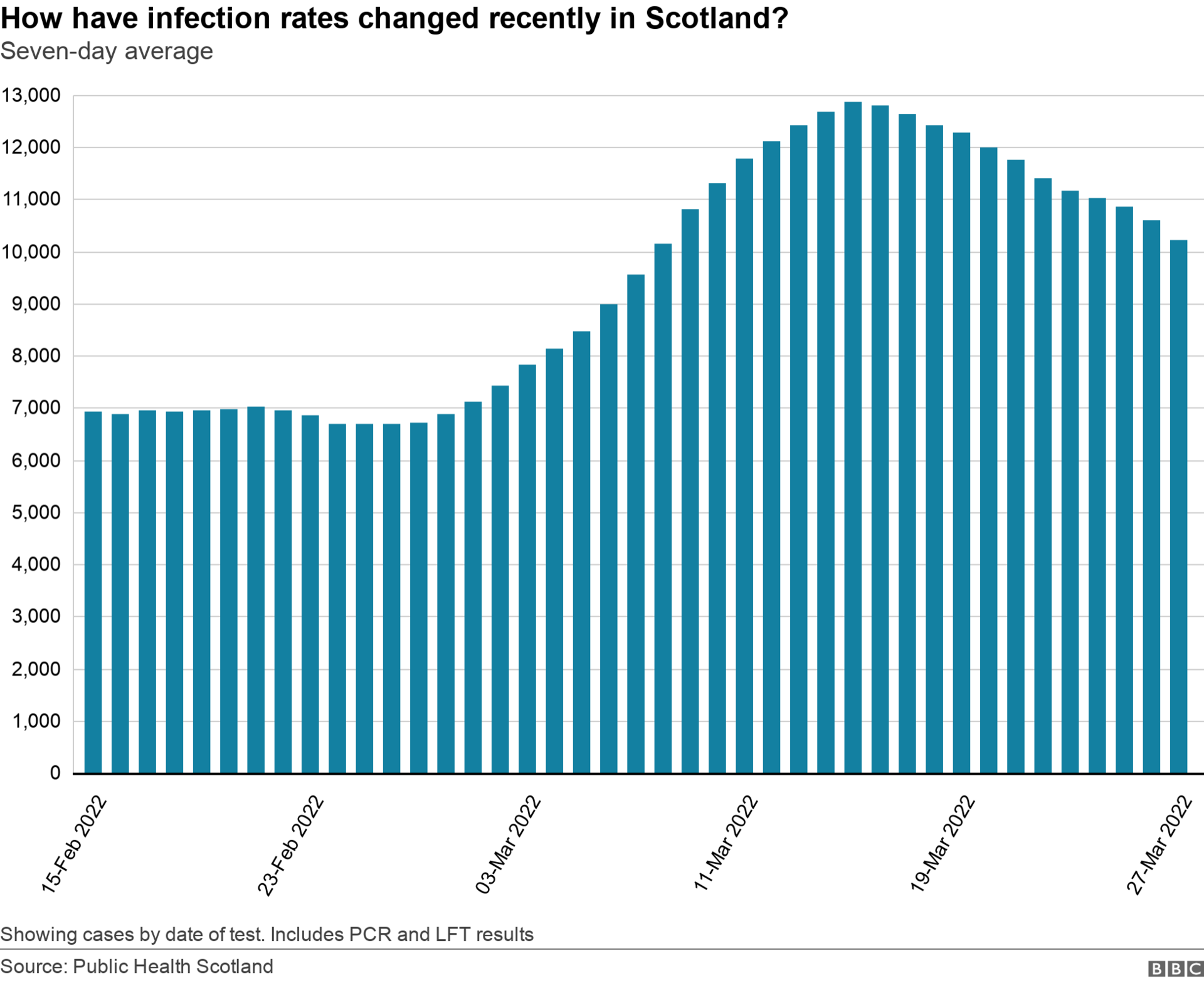End of Scottish face mask rules delayed until Easter
- Published

Scotland's mandatory face covering rules will now remain in force until 18 April, Nicola Sturgeon has announced.
The legal requirement to wear masks in shops and on public transport had been expected to be lifted next week.
But the first minister told MSPs that the changes would now not take effect until 18 April.
She said this was due to there still being a very high level of infection in Scotland, and because masks provide extra protection.
However, the requirement to wear a face covering in places of worship and while attending marriage and funeral services will end on 4 April.
Ms Sturgeon said this phased approach struck a "sensible balance between our desire to remove this one remaining legal measure and the common sense need for continued caution".
Case numbers have hit record levels in Scotland in recent weeks, with one in 11 people estimated to have had the virus in the week to 20 March.
Both Deputy First Minister John Swinney and Justice Secretary Keith Brown tested positive on Wednesday morning, just hours before Ms Sturgeon made her announcement.
Ms Sturgeon said the daily figures remained high but were "perhaps stabilising", with a 15% fall from about 12,000 cases to 10,200 over the past week.
She said there was therefore "grounds for optimism that this latest wave of infection may now have peaked".
However she said the high levels of infection and the pressure it was placing on the NHS meant the planned lifting of the law on face coverings would be delayed until 18 April.
She told MSPs that this would be a "proportionate precautionary measure while we pass the peak of this latest wave".
This is the second time the first minister has delayed lifting the face mask laws, which had originally been due to be removed on 21 March.
All of Scotland's other legal restrictions have already been phased out.

Ms Sturgeon said a delay was needed until Scotland passed the peak of the latest wave
Dr Christine Tait-Burkard, a leading infections expert at University of Edinburgh, told BBC Radio's Good Morning Scotland that cotton masks offered "much less protection" from the BA.2 subvariant because far fewer virus particles needed to be inhaled to catch it.
She said: "The surgical and cotton masks just allow for a little more of the virus to get through. They are still very good for people who are lower risk - they stop them shedding a lot of virus into the environment.
"For people who are more vulnerable it is probably the moment to increase to an FFP2 mask just until the pressure in the environment from so many people infected actually decreases."
Dr Tait-Burkard said she did not believe legal enforcement of face masks was needed any more, and that recommending people wear them in high risk environments was the right thing to do.
'Bitterly disappointing'
The mask laws will now be phased out, with the requirement to wear them in places of worship and at services to be dropped on 4 April.
Ms Sturgeon was pictured without a mask at a memorial service for Prince Philip on Tuesday, but insisted that she wore one on the train and "abided by the rules" while in England.
The Scottish Licensed Trade Association said it would have set a better example for the first minister to wear a face covering, adding that it was "bitterly disappointing" the changes had been delayed in Scotland.
Managing director Colin Wilkinson said the pause would ultimately make little difference as "the lack of use of face coverings is already clearly evident in many settings".
And the Scottish Chambers of Commerce said the "prolonging of Covid-19 rules" might make Scotland a less attractive tourist destination.

Scottish Conservative leader Douglas Ross said Scotland's case rate being higher than other parts of the UK showed that the first minister's "strategy is clearly failing".
He said: "She is keeping restrictions in place here in Scotland weeks after they have been removed elsewhere.
"We believe that anyone who wants to keep wearing a face mask should do so, but it should be down to individual choice as it is in other parts of the UK.
"We should leave it up to people and businesses to decide what is best for them based on public health advice - Nicola Sturgeon has to start trusting the people of Scotland."
Ms Sturgeon accused the Tory leader of being "seriously out of step with the vast majority of people".
She said: "Particularly in public places where people don't always have a choice about being, people have to go to shops and therefore if we all wear face coverings in shops right now we help protect each other.
"For a couple of weeks more while we see this wave of infection peak and start to fall I think that is a sensible thing to do."
The testing system is also being wound down in Scotland, with the population-wide contact tracing system to be shut down by the end of April.
Scottish Labour's deputy leader Jackie Baillie said infection levels were concerning, calling for more details about future support and testing for vulnerable people.
She said: "While life is returning to near normality for many, that is not the case for those who are immunocompromised and the 180,000 who were on the shielding list."
Ms Sturgeon said vulnerable people were being offered extra booster jabs, and that testing would continue to be used in a targeted way to support them.